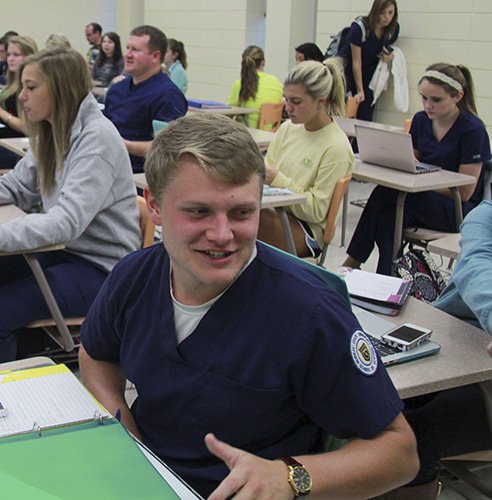
Students sit in a classroom in the School of Nursing, one of 100 nursing schools chosen for a White Coat Ceremony.
For the first time at Murray State, nursing students will don the age-old white coat – a traditional symbol of the medical profession.
Traditionally, white coat ceremonies were reserved for students graduating from medical school.
This is the first time in the field’s history that students entering the nursing profession are taking part in a White Coat Ceremony.
The Arnold P. Gold Foundation and the American Association of Colleges of Nursing awarded the Murray State School of Nursing up to $3,000 in funding the first White Coat Ceremony for undergraduates completing their Bachelor’s on Sept. 26.
Graduating medical students take part in a White Coat Ceremony, a tradition that began in 1989.
The ceremony, originally reserved for physicians, now includes nearly all professions in the medical sciences. The practice of ethical medicine, or compassionate care, sparked the idea for the ceremony.
“The White Coat Ceremony is meant to emphasize to students the need for compassionate care,” said Marcia Hobbs, dean of the School of Nursing.
The Hippocratic Oath is typically read at the ceremony and, as undergraduates would throw caps in the air, the future doctors would put on their white coats.
The oath has its roots in Greek history. Originally sworn to gods and goddesses, it declares unwavering commitment to the health and well-being of the swearer’s patients.
The Murray State School of Nursing was chosen for the ceremony by the Arnold P. Gold Foundation, which is dedicated to maintaining ethics and compassion in medicine. Murray the American Association of Colleges of Nursing, dedicated to advancing higher education in nursing.
Only 100 nursing schools were chosen in the United States.
Hobbs said the personal attention students get at Murray State is what set the School of Nursing apart from the rest.
“With the class size of 40 students, faculty know the students and follow up with them if there are problems,” Hobbs said.
Caleb Burchett, senior from Paducah, Ky., said after he was accepted into the School of Nursing, he heard that it is one of the best in the nation.
The rigorous curriculum challenges students but is also the reason students graduating from the program are more likely to be hired.
“We go for three years instead of two,” Burchett said. “Our core classes start earlier. Our curriculum is more in-depth. Our teachers take so long and focus on every little aspect of what we’re learning.”
Burchett said the best part of the program is the relationship he has with his teachers and fellow students.
“All of our professors are caring,” said Kelleigh Jones, senior from Paducah, Ky. “They invest in us.”
Janessa Tovar, senior nursing student, came from California to study at Murray State’s nursing school. Her online research led her to choose Murray State over other schools throughout the country.
Tovar’s journey through the program was complicated partly due to a pregnancy for which she had to go on bed rest near the end of her term.
“I had a beautiful pregnancy,” Tovar said. “The last two weeks though, my doctor put me on bed rest because of high blood pressure.”
Tovar said her teachers worked with her throughout the two weeks, helping her to get her work and continue learning. When her son was life-flighted to Vanderbilt Hospital a few weeks after his birth, her teachers helped her yet again.
“It was so incredible, the amount of accommodation they allowed me,” Tovar said.
Tovar finished the semester maintaining her all As and Bs record.
“We’re not just friends in the program,” Tovar said. “We’re honestly a family.”
Story by Amanda Grau, Staff writer